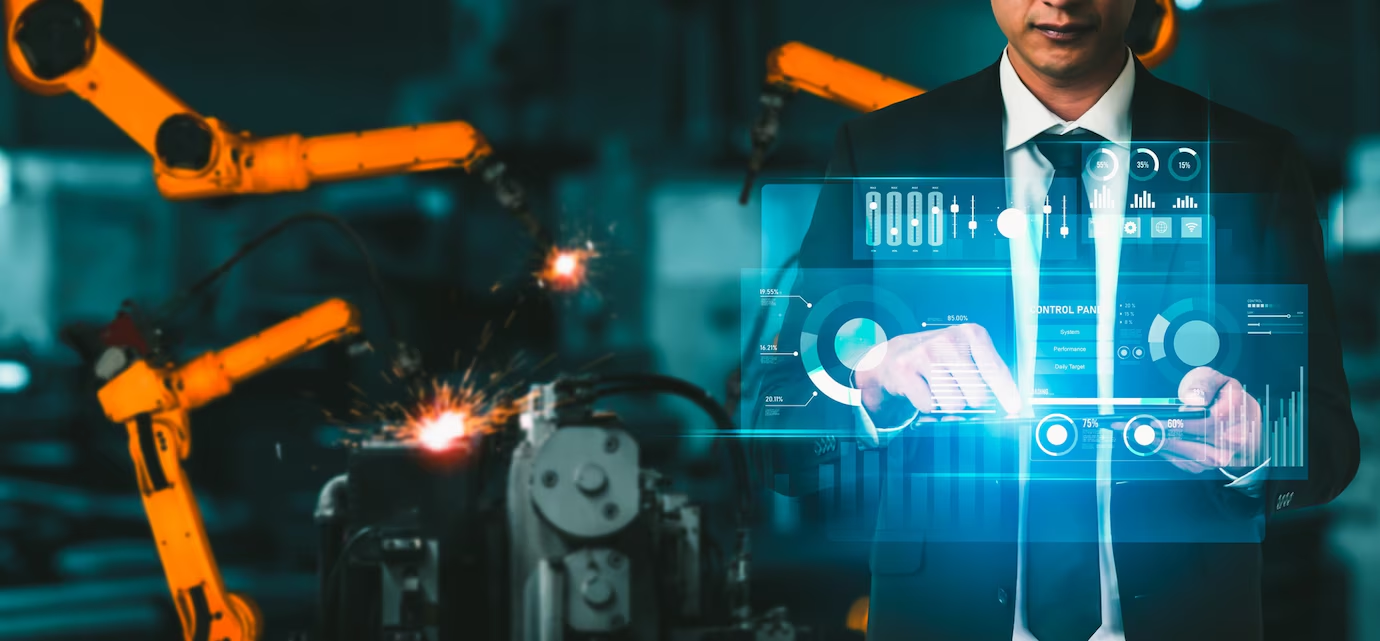AI in Production Planning: Enhancing Workflow Efficiency and Reducing Delays in Manufacturing

Staying ahead of the curve is not just an advantage—it's a necessity for the manufacturing industry. One critical aspect that can make or break operational success is production planning. It involves orchestrating a complex interplay of resources, time, and workflows to meet customer demands efficiently and cost-effectively.
However, traditional methods often fall short of managing the growing complexities of modern production. This is where Artificial Intelligence (AI) transforms production planning with its ability to analyze vast amounts of data, predict trends, and optimize processes. Using AI-based production planning, throughput times can be reduced by up to 62%, and productivity increased by up to 11%.
In this article, we’ll explore how AI increases workflow efficiency and minimizes delays, paving the way for a smarter, more agile manufacturing landscape.
What is AI in Production Planning?
AI is a broad term that refers to a set of methods and tools designed to utilize machines’ ability to mimic human cognition and behavior. In production planning, AI can analyze data about patterns and trends and use this to balance production requirements, ultimately yielding higher results.
Enhancing Workflow Efficiency Using AI
The primary purpose of AI in production planning is to improve the operational flow. To do this, advanced AI algorithms with custom software can analyze huge amounts of data to find potential problem areas in the production flow.
From this information, they can offer proposals for the right timing of production processes, more effective resource distribution, and streamlined repetitive activities. They can help with:
1. Predictive Maintenance
The first way AI can improve workflow is by helping to minimize resource use through effective maintenance prediction.
This involves using machine sensor data, which, through AI analysis, can be used to look for characteristic signs of an impending equipment breakdown. With these capabilities, manufacturers can predict the required maintenance cycles and smoothen their operations.
2. Supply Chain Optimization
AI for supply chain management can enhance all activities through demand forecasting, procurement automation, and inventory management.
Thus, together with dependability on supplier lead times, raw materials availability, and exploring future trends, intelligent predictive planning for optimizing the supply chain is achievable using AI.
3. Production Scheduling
Being an efficient scheduling tool, AI agents can also take up the task of production scheduling, which, if handled well, can increase the workflow.
AI algorithms can use various factors, such as worker productivity, a possible range of machine capabilities, and other resources, to create rational production schedules. This includes proper management, reflecting all the necessary aspects, and removing bottlenecks.
How to Minimize Delays in the Production Line
AI can help with optimizing time schedules by analyzing multiple streams of data fed to it and yield an optimal solution that will maximize productivity and time used. This can be achieved through several methods:
1. Real-time Monitoring
AI can perform real-time production monitoring to identify any production problem or disruption and suggest a viable solution. These problems can be removed if addressed prominently, and manufacturers can continue their production without delays.
2. Quality Control
Using AI Ops in quality control will make it easier to identify defects and variations in products as they are being produced.
When these problems are recognized, they are resolved early, thus avoiding production slowdowns, which are costly and time-consuming for the manufacturer. AI models can also rectify the problem using suggestive algorithms and pre-trained data to remove the defect.
3. Intelligent Manufacturing Execution System
AI can also enable intelligent manufacturing automation and minimize the inconsistency of human work. This means that the manufacturer's workforce will have an optimum amount of time to employ more resources to develop other facets of production, requiring more human interference.
Challenges and Limitations of AI in Production Planning
Even though the implementation of AI in production planning is very advantageous, there are still specific issues and limitations that manufacturers need to solve. These include:
1. Data Quality
AI algorithms are highly dependent on data since they are geared towards producing valid information and predictions.
If the data used to make these recommendations are wrong or some are missing, then the results obtained will be far from optimal.
2. Interoperation with Other Systems
Today’s manufacturing facilities may operate with outdated systems that might not integrate well with the new AI models.
Custom AI models can be developed to be compatible with outdated systems, but their integration may be complex, possibly requiring considerable investments in modification and enhancement.
3. Skill Gaps
With more firms utilizing AI technologies in practice, especially in pillar functions like production planning, manufacturers must assess possible skills deficiencies within their workforce. This change involves preparing employees for smart manufacturing technology and using AI in business.
Streamlining Production Planning With AI
From predictive maintenance and supply chain optimization to real-time monitoring and intelligent automation, AI has proven its ability to revolutionize production planning. While challenges like data quality, system integration, and workforce upskilling remain, the benefits far outweigh the drawbacks for manufacturers ready to adapt.
Using AI, businesses can streamline operations, reduce delays, and achieve a competitive edge in the global market. The future of manufacturing lies in innovation, and AI is leading the charge toward a more efficient and resilient production ecosystem. Utilizing AI today means building a stronger, smarter tomorrow.
Is your production planning ready for the future? At WEBaniX, we help manufacturers supercharge the power of AI to improve workflow efficiency, reduce delays, and optimize workflows with our custom-made software solutions. Connect with us to explore tailored solutions that will take your operations to the next level!

